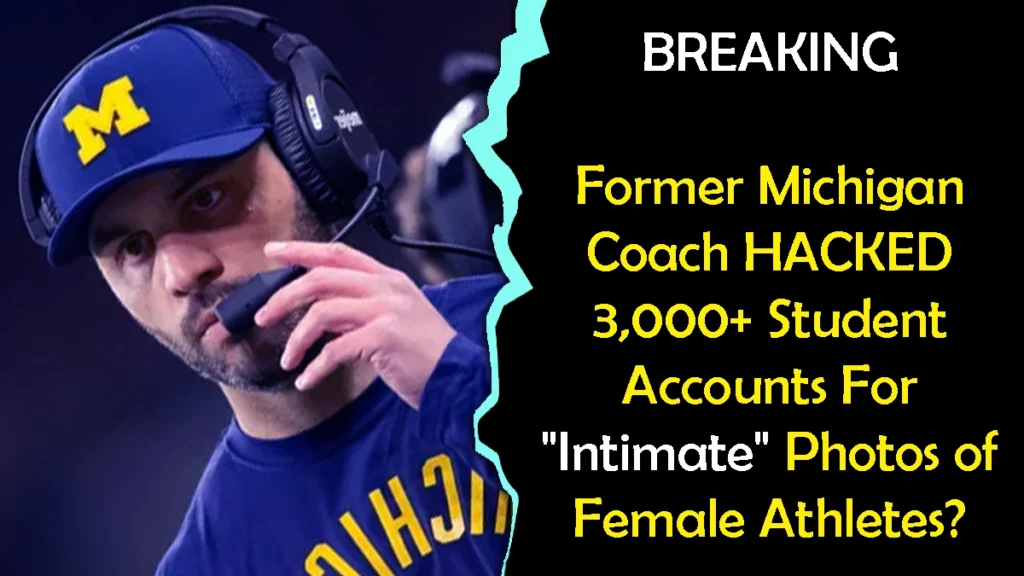
SCANDAL ROCKS COLLEGE SPORTS: Ex-Michigan Offensive Coordinator Matt Weiss Faces Federal Charges in Massive Hacking Case
A shocking case of digital privacy invasion spans nearly a decade and affects thousands of student-athletes across more than 100 universities
In a disturbing development that has sent shockwaves through the college sports world, former University of Michigan co-offensive coordinator Matt Weiss now faces serious federal charges after authorities uncovered what appears to be one of the most extensive digital privacy invasion cases in collegiate sports history.
The 42-year-old former coach, who worked alongside Jim Harbaugh at Michigan and previously with John Harbaugh at the Baltimore Ravens, has been indicted on multiple federal charges that could result in decades of imprisonment if convicted.
THE CHARGES: 24 Counts That Could Mean Years Behind Bars
Federal prosecutors have brought a total of 24 counts against Weiss, painting a picture of a systematic and prolonged campaign to access private information and intimate content:
- 14 counts of unauthorized access to computers (maximum penalty: 5 years imprisonment per count)
- 10 counts of aggravated identity theft (mandatory 2-year sentence per count)
If convicted on all charges, Weiss could potentially face up to 90 years in federal prison, though actual sentencing would likely be determined by federal guidelines.
THE TIMELINE: An 8-Year Digital Invasion of Privacy
According to the federal indictment, Weiss’s alleged criminal activities weren’t a momentary lapse in judgment but rather a calculated operation spanning nearly a decade from 2015 to 2023.
This timeline is particularly troubling as it covers Weiss’s tenure with both the Baltimore Ravens organization and the University of Michigan football program, suggesting that he allegedly conducted these activities while serving in high-profile coaching positions at prestigious institutions.
THE VICTIMS: Thousands of Students Targeted Across the Country
The scale of the alleged hacking operation is staggering. Federal investigators have determined that Weiss allegedly:
- Compromised computer systems at more than 100 different universities
- Stole the identities of over 3,000 students
- Downloaded confidential information belonging to more than 150,000 student-athletes
- Specifically targeted female college athletes
- Gained unauthorized access to social media accounts, email services, and cloud storage of approximately 3,300 additional individuals
What makes this case particularly disturbing is the apparent motivation behind the hacking. The indictment states that Weiss wasn’t after financial gain or competitive advantages for his coaching career.
THE MOTIVE: “Private Photographs and Videos Never Intended to Be Shared”
According to federal authorities, Weiss’s primary objective was deeply concerning: “Through this scheme, unknown to account holders, Weiss downloaded personal, intimate digital photographs and videos. His goal was to obtain private photographs and videos never intended to be shared beyond intimate partners.”
Even more troubling, the indictment alleges that “Weiss kept notes on individuals whose photographs and videos that he viewed, including notes commenting on their bodies and sexual preferences.” This suggests a level of organization and cataloging that goes beyond opportunistic privacy invasion.
THE DOWNFALL: How Authorities Caught Up With Weiss
The investigation that ultimately led to these charges began in early 2023 when the University of Michigan’s police department initiated an investigation into Weiss for suspected computer crimes. This investigation quickly escalated, resulting in Weiss being placed on administrative leave from his position with the Michigan football program.
Shortly thereafter, Weiss was terminated from his coaching position, though at the time, the full extent of the allegations against him was not publicly disclosed. Now, with the federal indictment unsealed, the magnitude of the alleged crimes has become clear.
THE LEGAL RESPONSE: Authorities Vow to Protect Digital Privacy
Acting U.S. Attorney Julie Beck made the government’s position clear in a strongly worded statement accompanying the indictment: “Our office will move aggressively to prosecute computer hacking to protect the private accounts of our citizens. We stand ready with our law enforcement partners to bring those who illegally invade the privacy of others to justice.”
This case represents one of the most high-profile prosecutions of computer crimes involving a public figure in college athletics and highlights the growing focus of federal authorities on digital privacy violations.
THE BACKGROUND: Weiss’s Coaching Career Now Overshadowed
Before these allegations came to light, Matt Weiss had established himself as a rising star in the coaching ranks. His connection to the Harbaugh coaching tree was particularly notable, having worked for both Jim Harbaugh at Michigan and his brother John Harbaugh with the Baltimore Ravens.
This connection to two of football’s most prominent coaching figures makes the allegations all the more shocking to the sports community. Weiss’s role as co-offensive coordinator at Michigan put him in a position of significant influence over student-athletes, making the targeting of college athletes particularly troubling from an ethical standpoint.
THE IMPLICATIONS: A Wakeup Call for Digital Security in College Athletics
This case raises serious questions about digital security protocols at universities nationwide. If one individual could allegedly gain access to systems at more than 100 institutions, it suggests potential vulnerabilities in how educational institutions protect sensitive student information.
For athletic departments specifically, the case may prompt a reevaluation of how student-athlete data is protected and who has access to personal information. Athletic departments typically maintain extensive databases of information on their student-athletes for academic, medical, and athletic purposes.
THE BROADER CONTEXT: Digital Privacy in the College Sports Landscape
College athletes already face unique challenges regarding privacy. Their performances are scrutinized publicly, their academic progress is monitored closely, and their social media presence is often subject to institutional oversight. This case highlights yet another vulnerability: their digital privacy.
Female athletes, in particular, have faced increasing problems with privacy violations in recent years. From unauthorized photography to social media harassment, women in sports often deal with invasions of privacy that their male counterparts don’t experience to the same degree. This case, with its specific targeting of female athletes, underscores this troubling reality.
WHAT’S NEXT: The Legal Process Begins
As this case moves through the federal court system, more details may emerge about the extent of the alleged hacking, how it was conducted, and the full impact on victims. Federal computer crime cases often involve extensive digital forensic evidence, which can take considerable time to process and present in court.
For the alleged victims, the process of determining whether their privacy was violated and to what extent could be lengthy and potentially retraumatizing. Universities may face questions about whether they could have done more to protect student information and whether they have adequately supported affected students.
THE TAKEAWAY: A Cautionary Tale for the Digital Age
This case serves as a stark reminder that digital privacy remains vulnerable, even within supposedly secure institutional systems. For student-athletes and others in the public eye, the risk of privacy violations is heightened by their visibility and the value others might place on their personal information.
For universities and athletic departments, the case should prompt a thorough review of digital security protocols and access controls. And for the broader public, it’s yet another reminder of the importance of strong password security, two-factor authentication, and caution regarding what private content is stored in cloud-based services.
As this case proceeds through the justice system, it will likely become an important reference point in discussions about digital privacy, institutional responsibility, and the protection of student-athletes from exploitation.
Disclaimer: This article is based on allegations contained in a federal indictment. All defendants are presumed innocent until proven guilty in a court of law. This article is open to suggestions and corrections. Reader opinions and additional information are always welcome as this story develops. If you have information relevant to this case or insights about digital privacy protections for student-athletes, please share your thoughts respectfully.
For Further Discussion:
- What responsibilities do universities have to protect student data?
- How can athletic departments better safeguard sensitive information?
- What resources should be available to victims of privacy violations?
